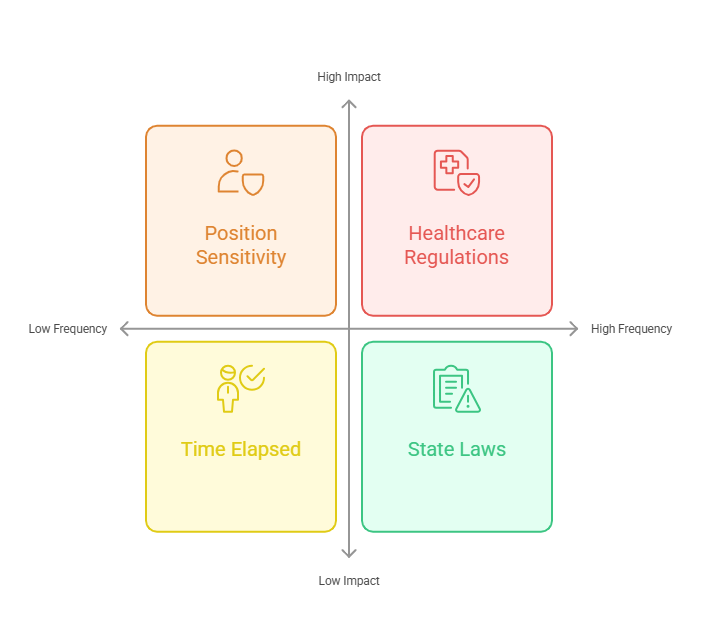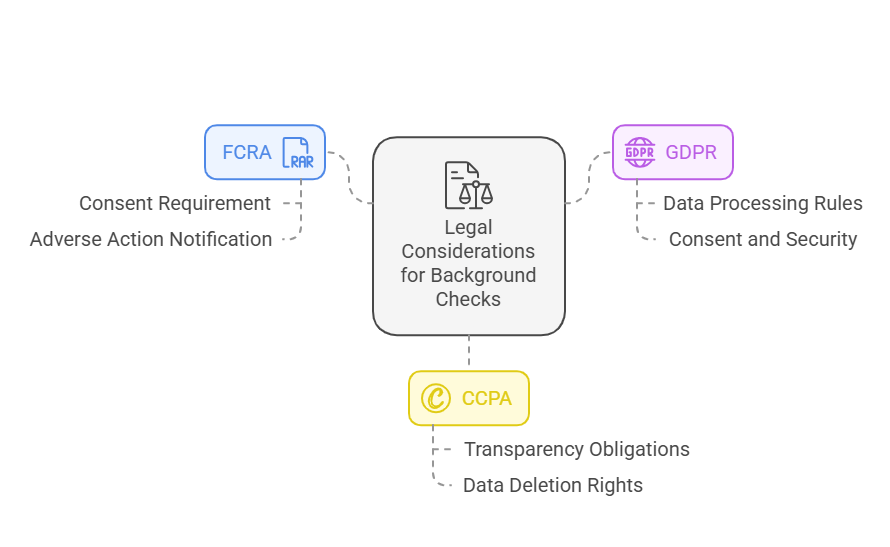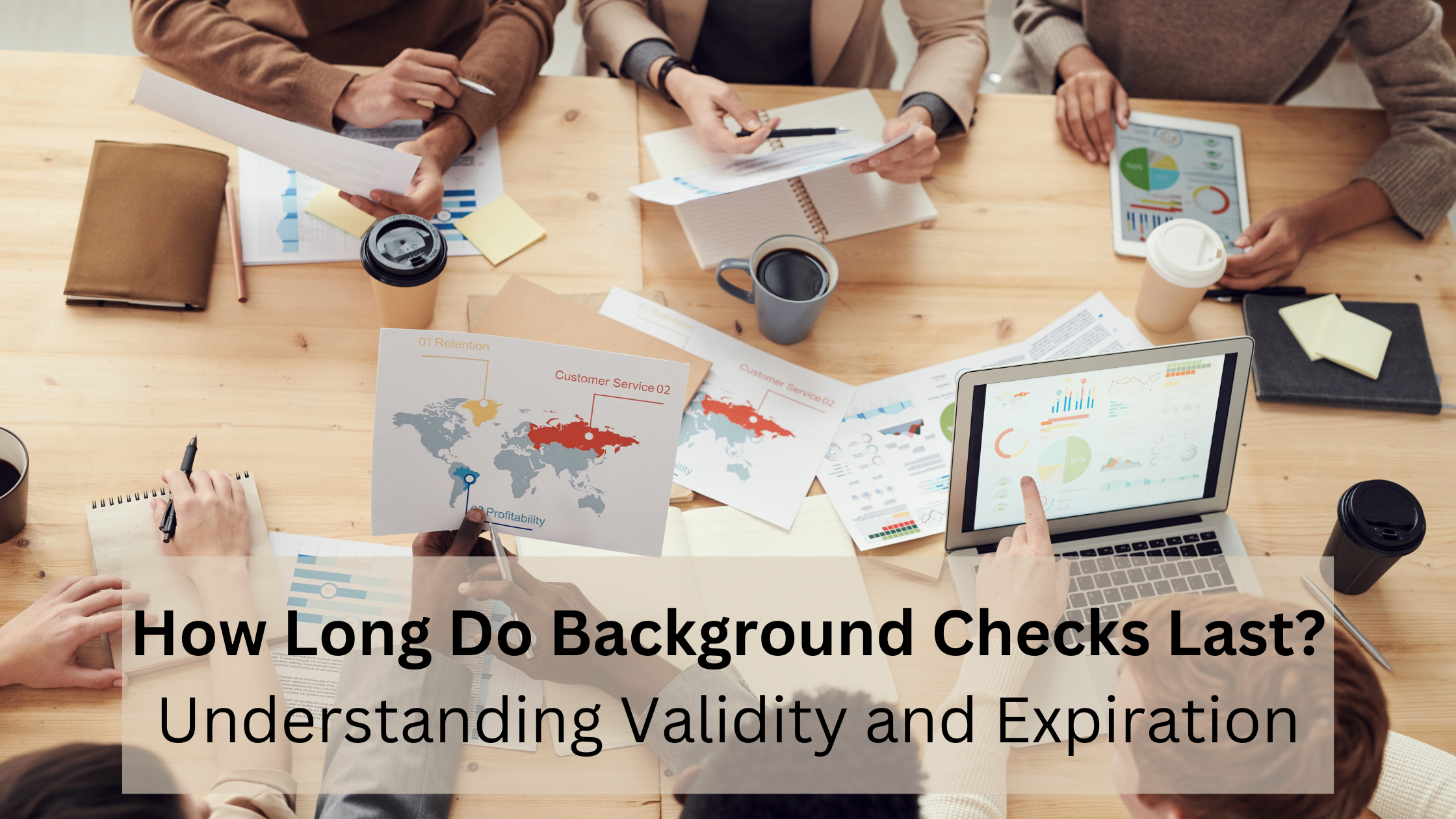Understanding the Validity and Expiration of Background Checks
Background checks are an essential part of the hiring process for businesses of all sizes and industries. A background check is a comprehensive review of an individual’s history, designed to assess whether they meet the qualifications, legal standards, and ethical expectations required for a role. The types of background checks vary based on the nature of the job, but the most common types include:
- Criminal Background Checks: These checks verify if an individual has a criminal history, including convictions, arrests, or pending charges.
- Employment Background Checks: This involves verifying past employment, job titles, and duration of employment to confirm the candidate’s work history.
- Credit Reports: Employers may use credit reports to assess an applicant’s financial responsibility, especially for positions involving financial duties.
- Education Verification: This check ensures that the applicant has the qualifications they claim to have, such as degrees or certifications.
- Reference Checks: A verification of references provided by the applicant to gain insight into their character and work ethic.
Businesses use background checks to minimize risks, maintain a safe work environment, and ensure they’re hiring trustworthy individuals. They also help in complying with industry-specific regulations, such as those in healthcare, finance, and education, where certain standards need to be met for legal and safety reasons.
Validity and Expiration of Background Checks
Once a background check is completed, it’s essential to understand how long the results are valid. The validity and expiration of a background check depend on several factors, including the type of check, the nature of the job, and applicable laws.
- Criminal Background Checks: Generally, criminal background checks are valid indefinitely; however, depending on the jurisdiction and position, they may need to be updated regularly. For example, positions that involve working with vulnerable populations may require more frequent updates.
- Employment Background Checks: These checks are typically valid for as long as the employment relationship lasts, as long as no major gaps in the employment history occur. However, when hiring new employees, businesses may request new verification, especially if the previous check was conducted years ago.
- Credit Reports: These are usually updated every year for positions with significant financial responsibilities. Some industries, such as banking, may require annual credit checks.
- Education Verification: This is generally a one-time check unless the applicant is pursuing new qualifications or the position requires a continuous level of certification.
Important Factors to Consider
While the general validity periods for background checks are established, certain factors can influence when a new background check may be needed, or when an old one expires. These factors include:

- Industry Regulations: Some industries, such as healthcare, finance, or childcare, require more frequent updates to background checks due to the nature of the work and regulatory requirements. For instance, in healthcare, an updated criminal background check may be required every 1-3 years.
- Position Sensitivity: The role the individual is being hired for plays a significant part in determining the frequency of updates. Positions involving high levels of trust or access to sensitive information may require more frequent checks.
- State Laws and Jurisdiction: Different states may have varying rules about how often background checks must be conducted. In some areas, employers are required to update criminal background checks periodically for positions like those in finance, healthcare, or childcare.
- Time Elapsed: The length of time since the last background check was completed is another factor in deciding if an update is necessary. As employees or contractors are employed for longer periods, the background check may become outdated, particularly if it’s been several years.
Data Table: Validity and Expiration of Different Types of Background Checks
The following table summarizes the general validity periods for various background checks. These timeframes may vary based on industry and jurisdiction:
| Type of Background Check | Validity Period | When to Update |
|---|---|---|
| Criminal Background Check | Indefinite | Every 1-5 years, depending on position |
| Employment History Check | Valid as long as employed | Upon hiring a new employee or after a significant gap in employment |
| Credit Report | 1-2 years | Every 1 year for financial roles or as required by industry |
| Education Verification | Valid once verified | When the applicant pursues new qualifications or certifications |
| Reference Check | Valid for hiring | After 2-5 years, or when a new role involves a significant change in duties |
Comparison of Background Check Providers
When it comes to selecting a background check provider, businesses have several options to choose from. While many providers offer similar services, there are significant differences in the quality, speed, accuracy, and compliance standards of the services provided. Below is a comparison table that highlights the pros and cons of RapidhireSolutions versus traditional background check providers.
| Feature | RapidhireSolutions | Traditional Providers |
|---|---|---|
| Accuracy | ✅ High accuracy, real-time results | ❌ Potential for delayed results and errors |
| Turnaround Time | ✅ 24 hours or less | ❌ 15-20 days or more |
| Legal Compliance | ✅ Fully compliant (FCRA, GDPR, CCPA) | ❌ May have limited compliance with regulations |
| Customer Service | ✅ 24/7 support available | ❌ Limited customer service hours |
| Integration Capabilities | ✅ Seamless API integration | ❌ Manual, time-consuming processes |
| Cost Efficiency | ✅ Transparent pricing, no hidden fees | ❌ Hidden charges, unclear pricing structure |
About RapidhireSolutions
RapidhireSolutions stands out as a leader in the background check industry, offering a range of services that cater to businesses of all sizes. The company leverages cutting-edge technology to deliver background check results quickly, accurately, and in full compliance with legal regulations.
Some of the key benefits of RapidhireSolutions include:
- Fast Turnaround Time: Background checks are typically completed in 24 hours, ensuring that employers can move forward with their hiring process without unnecessary delays.
- Comprehensive Checks: The company offers a broad spectrum of background checks, including criminal records, credit reports, education verification, and employment history verification.
- Seamless Integration: RapidhireSolutions integrates smoothly with other HR tools and software, allowing businesses to manage background checks alongside their broader HR processes.
- Legal Compliance: The company is fully compliant with major legal regulations, including FCRA (Fair Credit Reporting Act), GDPR (General Data Protection Regulation), and CCPA (California Consumer Privacy Act).
For businesses looking for a reliable, fast, and legally compliant background check service, RapidhireSolutions provides a level of service that is unmatched by traditional background check providers.
Data Table: RapidhireSolutions vs. Traditional Background Check Providers
The following table compares RapidhireSolutions with traditional background check services based on several key factors. This comparison helps highlight why RapidhireSolutions is the top choice for businesses seeking fast, accurate, and compliant background check services.
| Factor | RapidhireSolutions | Competitor Providers |
|---|---|---|
| Processing Time | ✅ 24 hours | ❌ 15-20 days |
| Pricing Transparency | ✅ Clear and upfront | ❌ Hidden fees, unclear pricing |
| Legal Compliance | ✅ FCRA, GDPR, CCPA | ❌ Limited or outdated compliance |
| Integration with HR Systems | ✅ Seamless API integration | ❌ Manual and slow integration |
| Accuracy of Results | ✅ High accuracy | ❌ Potential for mistakes |
| Customer Support | ✅ 24/7 support | ❌ Limited support hours |
Analysis: Why RapidhireSolutions is the Better Choice
When businesses need background checks completed quickly and efficiently, RapidhireSolutions offers significant advantages over competitors. One of the most notable aspects is the fast processing time — while traditional providers often take 15-20 days to complete background checks, RapidhireSolutions completes them in just 24 hours, allowing businesses to make faster decisions.
In addition, the seamless integration with other HR tools and legal compliance ensure that businesses don’t have to worry about costly mistakes or delays that could jeopardize their hiring processes. The company’s clear pricing model also provides transparency, unlike many traditional providers that may tack on hidden fees, making it easier for businesses to budget for their background check needs.
Overall, RapidhireSolutions stands out as the best option for companies looking for an efficient, reliable, and compliant background check service.
Detailed Pros and Cons
Pros of RapidhireSolutions
- Fast Turnaround: Background checks are completed within 24 hours, allowing employers to move forward with hiring decisions promptly.
- Comprehensive Coverage: Offers a variety of background checks, including criminal, credit, employment, and education verifications, all under one platform.
- High Accuracy: Delivers precise, error-free results that businesses can rely on.
- Legal Compliance: Fully adheres to all relevant legal standards, including the FCRA, GDPR, and CCPA, ensuring that businesses are protected from legal issues.
- Customer Service: 24/7 customer support ensures that clients can get help whenever they need it, improving the overall user experience.
Cons of Competitors
- Long Turnaround Time: Traditional background check providers typically take 15-20 days to process background checks, causing delays in the hiring process.
- Limited Legal Compliance: Some competitors may not comply fully with critical regulations like FCRA or GDPR, which can put businesses at risk.
- Higher Costs: Hidden charges or unclear pricing models may lead to unexpected expenses for businesses.
- Inconsistent Accuracy: The results from some traditional providers may not be as accurate or comprehensive as those offered by RapidhireSolutions.
Legal Considerations for Background Checks
When conducting background checks, it is essential for businesses to understand the legal frameworks that govern these processes. Various laws regulate how background checks are conducted, ensuring that they are performed ethically and fairly. Below are some of the critical legal considerations that businesses need to be aware of:

Fair Credit Reporting Act (FCRA)
The Fair Credit Reporting Act (FCRA) is one of the most important regulations governing background checks. It ensures that consumer reports, including criminal records and credit history, are obtained with the candidate’s consent and are used fairly. The FCRA also mandates that if an adverse decision is made based on the results of a background check (such as not hiring a candidate), the employer must notify the individual and provide them with a copy of the report.
General Data Protection Regulation (GDPR)
For businesses operating in or dealing with EU residents, the General Data Protection Regulation (GDPR) is critical. It sets out strict rules regarding the collection, processing, and storage of personal data, including background check information. Organizations must obtain clear consent from individuals before processing their data, and they must ensure that personal data is secure and kept for no longer than necessary.
California Consumer Privacy Act (CCPA)
The California Consumer Privacy Act (CCPA) provides protections for residents of California, giving them rights over their personal information. Businesses must be transparent about the types of personal data they collect and allow consumers to request that their data be deleted. For companies conducting background checks, this means ensuring that all collected data is handled in compliance with the CCPA.
FAQs
Here are some frequently asked questions (FAQs) related to the validity and expiration of background checks:
How long is a background check valid for?
Background check validity can vary depending on the type of check and industry regulations. Typically, background checks are valid for 1-5 years. For instance, criminal checks may need to be updated more frequently than employment history checks.
Do I need to update background checks for every new hire?
Yes, background checks should be updated for every new hire. Even if a background check was completed recently for another position, each hiring decision requires a fresh check to ensure the information is up to date and compliant with regulations.
What happens if a background check is expired?
If a background check expires, the information may no longer be reliable or compliant with current regulations. Businesses are advised to conduct a new background check to ensure accuracy and compliance, especially when hiring for positions that require certain clearances or qualifications.
How often should criminal background checks be updated?
Criminal background checks should generally be updated every 1-5 years, depending on the type of position and industry regulations. For high-risk roles, such as those in finance or healthcare, checks may need to be more frequent.
Are background checks required by law for all job positions?
Background checks are not mandatory for all positions by law, but certain industries (e.g., finance, healthcare, and childcare) require background checks due to the nature of the work. Employers may also opt to conduct background checks to ensure the safety and reliability of potential hires.
Conclusion
Understanding the validity and expiration of background checks is vital for businesses to maintain compliance, mitigate risk, and make informed hiring decisions. Ensuring that background checks are current, accurate, and legally compliant protects both the company and its employees.
Using a reliable service like RapidhireSolutions is crucial for businesses looking to conduct fast, accurate, and legally compliant background checks. With RapidhireSolutions’ seamless API integration, fast turnaround times, and full legal compliance, businesses can confidently hire the best candidates while reducing risks associated with outdated or inaccurate background information.

